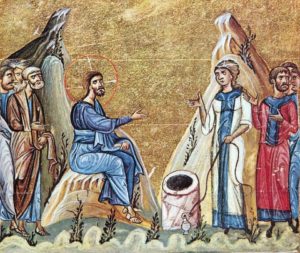Modern orthodoxy insists that Jesus must be worshiped as God. A failure to do so will automatically disqualify you from being a Christian, so says mainstream Christianity. One evangelist recently elaborated on this oft repeated mantra:
But if people miss the reality that Jesus was more than a prophet—that He is actually part of the Trinity, and therefore God—then they’re not truly Christians. You cannot say you’re a Christian and not worship Jesus. It doesn’t work that way.[1]
While many would agree with this evangelist’s assessment, the Bible does not. Most Christians are not aware that this so-called non-negotiable prerequisite for becoming a Christian, indeed for salvation, does not appear in Scripture. We are never told that we must worship Jesus as God or that a failure to do so will result in eternal damnation. Rather, the doctrine, which was first codified in the Athanasian Creed,[2] took several hundred years after Jesus’ ascension to develop. Instead of looking to post-Biblical sources for instruction about God-worship, we must look to Scripture. Thankfully, Jesus delivered a teaching in the gospel of John that specifies exactly who we are to worship as God.
Who Did Jesus Say Should Receive God-Worship?
When Jesus and his disciples were en route to Galilee, they passed through Samaria and stopped outside the city of Sychar. Jesus rested at Jacob’s well while his disciples went into the city to buy food. When a woman came to the well to draw water, Jesus said to her, “Give me a drink.”
John 4:9-15 (NASB) Therefore the Samaritan woman *said to Him, “How is it that You, being a Jew, ask me for a drink since I am a Samaritan woman?” (For Jews have no dealings with Samaritans.) 10Jesus answered and said to her, “If you knew the gift of God, and who it is who says to you, ‘Give Me a drink,‘ you would have asked Him, and He would have given you living water.” 11 She *said to Him, “Sir, You have nothing to draw with and the well is deep; where then do You get that living water? 12 “You are not greater than our father Jacob, are You, who gave us the well, and drank of it himself and his sons and his cattle?” 13 Jesus answered and said to her, “Everyone who drinks of this water will thirst again; 14 but whoever drinks of the water that I will give him shall never thirst; but the water that I will give him will become in him a well of water springing up to eternal life.” 15 The woman *said to Him, “Sir, give me this water, so I will not be thirsty nor come all the way here to draw.” (emphasis added)
Jesus then adroitly revealed the woman’s need for living water:
John 4:16-18 (NASB) He *said to her, “Go, call your husband and come here.” 17 The woman answered and said, “I have no husband.” Jesus *said to her, “You have correctly said, ‘I have no husband’; 18 for you have had five husbands, and the one whom you now have is not your husband; this you have said truly.”
The woman responded with her own revelation about Jesus and a comment about worship:
John 4:19-22 (NASB) The woman *said to Him, “Sir, I perceive that You are a prophet. 20 “Our fathers worshiped in this mountain, and you people say that in Jerusalem is the place where men ought to worship.” Jesus *said to her, “Woman, believe Me, an hour is coming when neither in this mountain nor in Jerusalem will you worship the Father. 22 “You worship what you do not know; we worship what we know, for salvation is from the Jews. (emphasis added)

The woman was correct. Not only was Jesus a prophet, he was the prophet that Moses promised God would send.[3] And since the Jewish prophet was able to reveal hidden things, she brought up the controversy that existed between Samaritans and Jews regarding which temple was sanctioned by God for worship. As a monotheistic Samaritan, she believed God was to be worshiped at Mt. Gerazim,[4] in contrast to the Jews, who worshiped God at Mt. Zion in Jerusalem.[5] As a part of his response to the woman’s comment about where they were to worship, Jesus specified who was to be worshiped. It is this aspect of Jesus’ teaching that is often overlooked by Trinitarians:
John 4:23-24 (NASB) “But an hour is coming, and now is, when the true worshipers will worship the Father in spirit and truth; for such people the Father seeks to be His worshipers. 24 “God is spirit, and those who worship Him must worship in spirit and truth.” (emphasis added)
Note that Jesus used the terms Father and God interchangeably, something that is confirmed by the use of singular masculine pronouns. According to Jesus, God the Father is to be worshiped. Jesus makes no mention of the Son or the Holy Spirit as being worthy of receiving God-worship. Rather, the emphasis is on the Father alone as being the God who must be worshiped in spirit and truth.
What’s more, Jesus pointed out that it is the Father who is seeking true worshipers. Again, Jesus makes no mention that he or the Holy Spirit are also seeking worshipers. On the contrary, the Father is the only person in the “God” category. He is the only one who is to be worshiped, and the only one seeking worshipers.
Jesus is the Messiah
Instead of being God, Jesus clearly identifies himself as the promised Messiah, that is, the Christ:
John 4:25-26 (NASB) The woman *said to Him, “I know that Messiah is coming (He who is called Christ); when that One comes, He will declare all things to us.” 26 Jesus *said to her, “I who speak to you am He.” (emphasis added)
And when the woman returned to the city to report who she had encountered at the well, they also understood Jesus to be Christ:
John 4:28-30 and 39-42 (NASB) So the woman left her waterpot, and went into the city and *said to the men, 29 “Come, see a man who told me all the things that I have done; this is not the Christ, is it?” 30 They went out of the city, and were coming to Him. 39 From that city many of the Samaritans believed in Him because of the word of the woman who testified, “He told me all the things that I have done.” 40 So when the Samaritans came to Jesus, they were asking Him to stay with them; and He stayed there two days. 41 Many more believed because of His word; 42 and they were saying to the woman, “It is no longer because of what you said that we believe, for we have heard for ourselves and know that this One is indeed the Savior of the world.” (emphasis added)
What was it that so many citizens of Sychar believed about Jesus? That they must worship him as God if they wanted to be Christians? No! They believed what Jesus had said about himself, that he was the Christ. They understood that he was the one sent to be the Savior of the world.[6]
The Father is the One True God
Later, in this same gospel, Jesus affirmed the truths that he shared with the woman at the well:
John 17:1-3 (NASB) Jesus spoke these things; and lifting up His eyes to heaven, He said, “Father, the hour has come; glorify Your Son, that the Son may glorify You, 2 even as You gave Him authority over all flesh, that to all whom You have given Him, He may give eternal life. 3 “This is eternal life, that they may know You, the only true God, and Jesus Christ whom You have sent. (emphasis added)
Jesus said that the Father is the only true God, while he is the Christ, whom the one true God sent. This only true God is the God that Jesus said must be worshiped in spirit and truth. Surely, Jesus’ testimony carries more authority than creeds that took four centuries to develop!

The Water of Eternal Life
We also read in the John 17 passage that God gave Jesus the authority to extend eternal life to all whom the Father has given him. This authority did not inherently belong to Jesus, rather it was delegated to him by God. It is no wonder that Jesus told the woman at the well that if she had asked, he would have given her water from the well of eternal life.[7] According to Jesus, the gift of eternal life comes from God who is the Father, through His mediator, the Messiah, to all who believe.[8]
If Jesus is God, his failure to include himself and the Spirit in his response about true worship is misleading if not an outright lie. But Jesus was without sin so we know that he did not misinform, mislead, deceive or lie to the woman.[9] The reason Jesus did not include himself as one who should receive God-worship is simply because he is not God, but the human Messiah sent by God.
Jesus’ teaching in John chapter 4 and his prayer in John 17 undermine modern orthodoxy which insists that Jesus must be worshiped as God and that you have to believe in the Trinity to be considered a Christ-follower and thus obtain eternal life. Truly, as Jesus said, the hour has come for us to worship the Father:
John 4:23-24 (NASB) “But an hour is coming, and now is, when the true worshipers will worship the Father in spirit and truth; for such people the Father seeks to be His worshipers. 24 “God is spirit, and those who worship Him must worship in spirit and truth.” (emphasis added)
[1] Kendra Semmen quoting evangelist Chris Mikkelson, Evangelist: You Can’t Say You’re Christian if You Don’t Worship Jesus, Charisma News, 12-13-19, accessed 5-13-21, https://www.charismanews.com/culture/79193-evangelist-you-can-t-say-you-re-christian-if-you-don-t-worship-jesus
[2] Many scholars date the Athanasian Creed to about 500 A.D.
[3] Deuteronomy 18:15.
[4] The Samaritans were related to those Israelites who were not deported by the Assyrians after their conquest of Israel in 722 BC. They held to the Pentateuch and believed they were to worship God at Mt. Gerizim according to Deuteronomy 11:29.
[5] Deuteronomy 12:5-11; 2 Samuel 7:10-13; 2 Chronicles 6:1-6; Psalm 135:21
[6] Isaiah 49:6; Matthew 1:21; Luke 2:11; John 1:29; Acts 5:31; 13:23, etc.
[7] John 4:10-14.
[8] The apostle Paul declared the same message. God, who is the Father, offers the gift of eternal life, through Jesus who is the Christ. Romans 1:7 and 6:23. Jesus is human mediator between God and man. (1 Timothy 2:5)
[9] 2 Corinthians 5:21; Hebrews 4:15.





I have believed this truth for over 50 years and extracted it from other biblical texts and from discernment from the Holy Spirit.
Greetings David!
Thanks for reading and commenting. So glad to hear you have walked in the truth of God’s word.
Blessings,
OGW